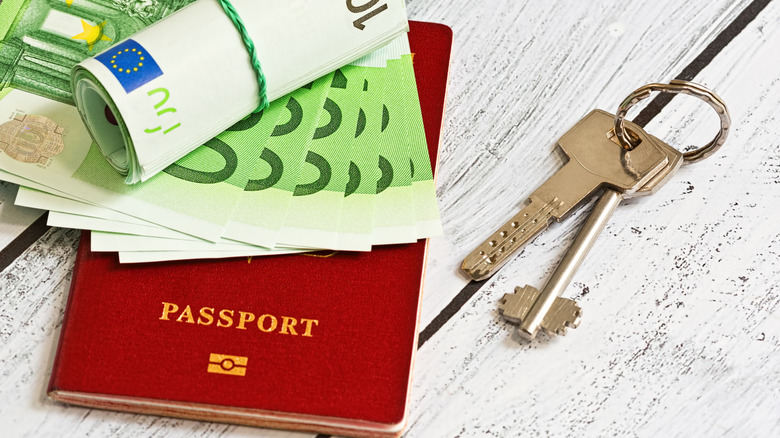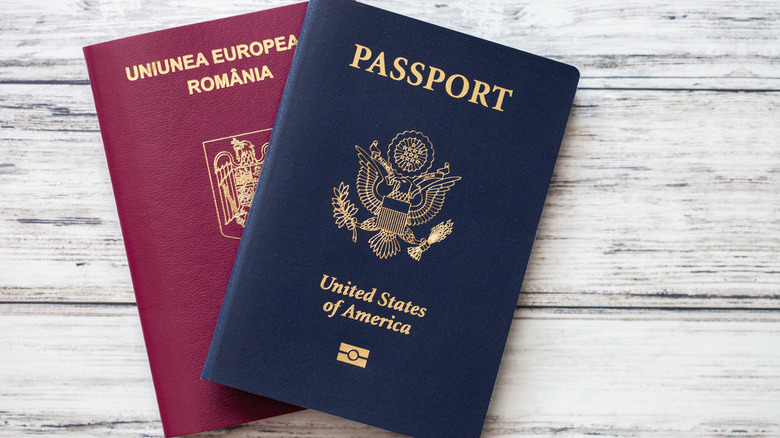The World's Toughest Country To Get Dual Citizenship Might Shock You
Wallet? Check. Credit card? Check. Passport? Check. What about that second passport? Whether it's for political purposes, easier access to work or education, or to invest and protect your nest egg, millions of people around the world today are looking to acquire a second form of citizenship. If you are looking for an easy run to your second golden ticket, tiny Qatar would be one of the toughest countries to choose for a second passport due to the marathon of bureaucratic hoops foreigners have to jump through to become Qatari, including living in the country for 25 years and officially renouncing your other citizenship. If you don't, they may confiscate your U.S. or foreign passport — if they find out you have one.
Determining a person's citizenship around the world can be a complicated subject. Primarily, citizenship is based on two principles: jus soli (Latin for right of soil) and jus sanguinis (Latin for relating to blood). Countries such as the United States, Argentina, and Mexico provide citizenship on the principle of jus soli from being born on the country's soil, regardless of where the child's parents are from or the child's ethnicity.
Many European nations, such as Ireland and Italy, allow citizenship based on the principle of jus sanguinis, or having direct blood ties to the country. Other countries, such as Australia, have changed their citizenship policies in the past from jus soli to jus sanguinis, making citizenship more restrictive. Moreover, countries such as Qatar and Saudi Arabia specify that citizenship can only be passed down from the father, making children born to a local woman and a foreign man non-citizens, and unable to access basic services such as healthcare and schools.
How to get a second type of citizenship
Citizenship is important for travel, as it determines eligibility for passports and visas, tax laws, emergency protection, and access to medical care when abroad. In 2022, Forbes estimated that approximately 40% of Americans could gain dual citizenship — either by birth, family ties, or investment — in another country. Yes, if you are wealthy enough, you can legally purchase a second passport. Since 1984, St. Kitts and Nevis has offered citizenship and a passport with visa-free access to Europe and much of Asia to woo wealthy investors. More recently, countries like Greece, Portugal, Malta, and Vanuatu have also developed policies to ease naturalization and citizenship for large investments in the country in real estate, government bonds, or local businesses.
No matter how many zeros you have in your bank account, Americans of direct Irish or Italian descent can apply for dual citizenship in the respective country based on their heritage and family lineage. The process can take several months and requires a detailed and complete application, but successful applicants will have benefits afforded to EU citizens, including health care and the right to live and work in all EU member states. Not all countries see dual citizenship positively, though. China's government sees dual citizenship as a national security threat, although it does not stop wealthy Chinese citizens from pushing for that second passport as a lifeline.
However, Giving up your U.S. citizenship isn't as easy as walking into a consulate or embassy and handing over your passport. You'll have to be outside the United States, pay $2,350, and attest that you hold citizenship from another country. Further, you will have to comply with U.S. visa regulations and may be subject to taxes, even if you plan on never returning to the United States.
What happens if I get dual citizenship?
If you are eligible for dual citizenship, a second passport can make international travel easier — if the passport ranks high on the Henley Passport Index. Depending on your second country of citizenship, you would likely gain the right to own property, vote, study, or travel freely within the country or neighboring countries that share a mobility or labor agreement. However, dual citizenship can be a double-edged sword, and it could create obligations for the traveler.
A dual citizen arrested or detained in their other country of citizenship or country of birth will likely be unable to have sufficient diplomatic and consular protection if they are recognized as a citizen in that country. Naturalized Chinese-Australians, Chinese-Americans, and Russian-Americans who have been arrested have been subject to their country of birth's laws, including ignoring their right to notify the U.S. embassy and providing access to a consular officer.
Depending on the country of citizenship, dual citizens will have a responsibility to defend their country, even if they have spent little to no time there as a child. Countries such as South Korea and Switzerland mandate military service for males, and dual citizens will be expected to serve according to their country's laws or face penalties. And, if you are looking to live abroad long-term, many countries in Europe, Asia, and the Caribbean offer golden residence visas. You will not gain citizenship or a passport, but you will have the right to live in the country as long as you meet the visa conditions — and that includes paying your taxes. Americans, regardless of where they live, are required to file taxes on their worldwide income.


